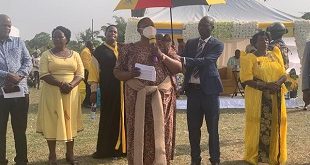
Kampala, Uganda | THE INDEPENDENT | The World Bank projects Sub-Saharan Africa to garner an economic growth of 3.1 percent in 2018, and increase of over one percent from 2017.
Recent data in the Africa Economic Update released Wednesday afternoon point to a moderate strengthening of economic growth in early 2018.
The report known as Africa’s Pulse, a bi-annual analysis of the state of African economies, projects the growth to firm to an average of 3.6 percent in 2019-20.
East Africa, excluding Uganda, registered impressive economic growth of over six percent. The countries are Ethiopia, Kenya, Tanzania and Rwanda.
Both the Bank of Uganda and Uganda Bureau of Statistics, project Uganda’s economic growth at about five percent.
Commenting on the continental growth, the World Bank Chief Economist for Africa, Albert Zeufack, said although the 3.1 percent growth is good news, it is not fast and strong enough like before 2014 when commodity prices collapsed.
Zeufack said in order to boost growth further, way above economic growth, African economies need to speed up macroeconomic reforms, execute fiscal consolidation, deepen structural and regulatory reforms, and embrace innovation and technology in order to boost productivity and efficiency.
The report, released simultaneously across Africa, also points to rising debt burden of African economies.
The report reveals that the number of African countries that have moved into the category of high risk of debt increased to 18 from eight by the beginning of February 2018.
The report points out that the structure of debt has moved from concessional loans, like provided by the World Bank, to include private sector and sovereign debts, in addition to domestic borrowing, with high market-related risks.
Commenting on the increasing debt, Zeufack said there is a need to borrow in a more sustainable manner in order to service the debt.
He said the World Bank is working with countries to borrow more of concessional loans than from the market, and use it for activities that attract more private investments.
The report also says African economies need to leverage innovation in order to provide access to electricity in a more reliable, affordable and sustainable way.
The report points out that only 42 percent of African households have access to electricity, and less than 10 percent in some countries.
The report further notes that where electricity is available, there is the problem of unreliability, which threatens long-term economic growth.
In order to address the problem of inadequate and unreliable electricity, Zeufack said innovation is key, especially in a combination of solutions for national grid, off or mini grids and renewable energy, especially solar, citing Kenya’s approach as an example.
Zeufack also proposed home-scale solutions, addressing issues of pricing, reduced regulatory barriers and efficiency of electricity utilities.
World Bank Lead Economist for Africa Region, Punam Chuham-Pole, while commenting on the increasing debt, said it raises risks countries face when they go to borrow, as well as making them vulnerable to exchange rate movement, global conditions and commodity price shocks.
Punam suggests that countries should focus more on managing risks and debt in general, as well as focus on fiscal adjustment, expansion of revenue generation and enhancement of domestic revenue mobilisation.
Although the report paints a relatively better performance of neighbors Rwanda, Tanzania, Kenya and Ethiopia, Uganda is somehow lagging behind in economic growth.
 The Independent Uganda: You get the Truth we Pay the Price
The Independent Uganda: You get the Truth we Pay the Price


